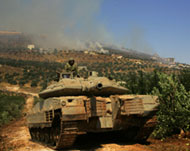EU waters down ceasefire call
The European Union has called for an immediate end to hostilities in Lebanon, watering down demands for an immediate ceasefire at the insistence of Britain and other US allies.

A joint statement adopted at a crisis meeting of the 25-nation bloc on Tuesday said: “The council calls for an immediate end to hostilities to be followed by a sustainable ceasefire.”
The 25 EU foreign ministers agreed to call for an urgent halt to the fighting, effective immediately.
Britain, Germany and others initially were against such a call.
No ceasefire
Frank-Walter Steinmeier, the German foreign minister, said the EU agreement did not mean an immediate ceasefire.
“Cessation of hostilities is not the same as a ceasefire,” he said. “A ceasefire can perhaps be achieved later… We can now only ask the UN Security Council and put pressure on it and not to waste any more time.”
 |
|
US allies pushed the EU to water |
Erkki Tuomioja, the Finnish foreign minister, whose country holds the rotating EU presidency, said the EU urged the UN Security Council to be “rapidly convened” to agree on a resolution to end the fighting.
Javier Solana, the EU foreign policy chief, said: “We hope our voice will be heard in the solution of this conflict.”
He was tasked by EU foreign ministers to continue his mediation role in finding a peaceful solution.
The United Nations on Tuesday said ambassadors from the five permanent members of its Security Council and Kofi Annan, the secretary-general, held “frank discussions” on the crisis.
“They discussed the cessation of hostilities, a ceasefire and political framework for a settlement, the composition and deployment of a stabilisation force for Lebanon, and the humanitarian situation,” a UN statement said.
The world body also said it would host a meeting on Thursday of contributors to a possible international force to be sent to Lebanon.